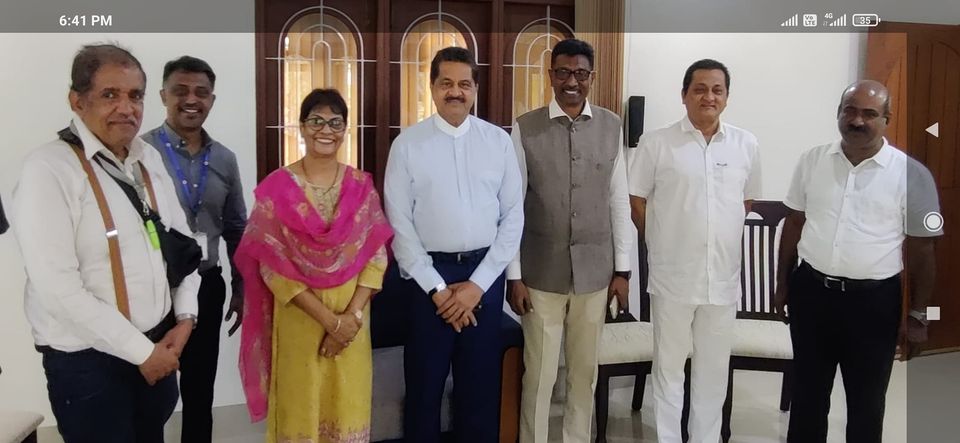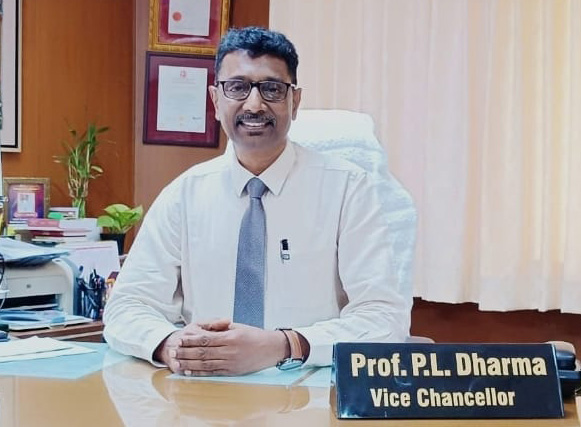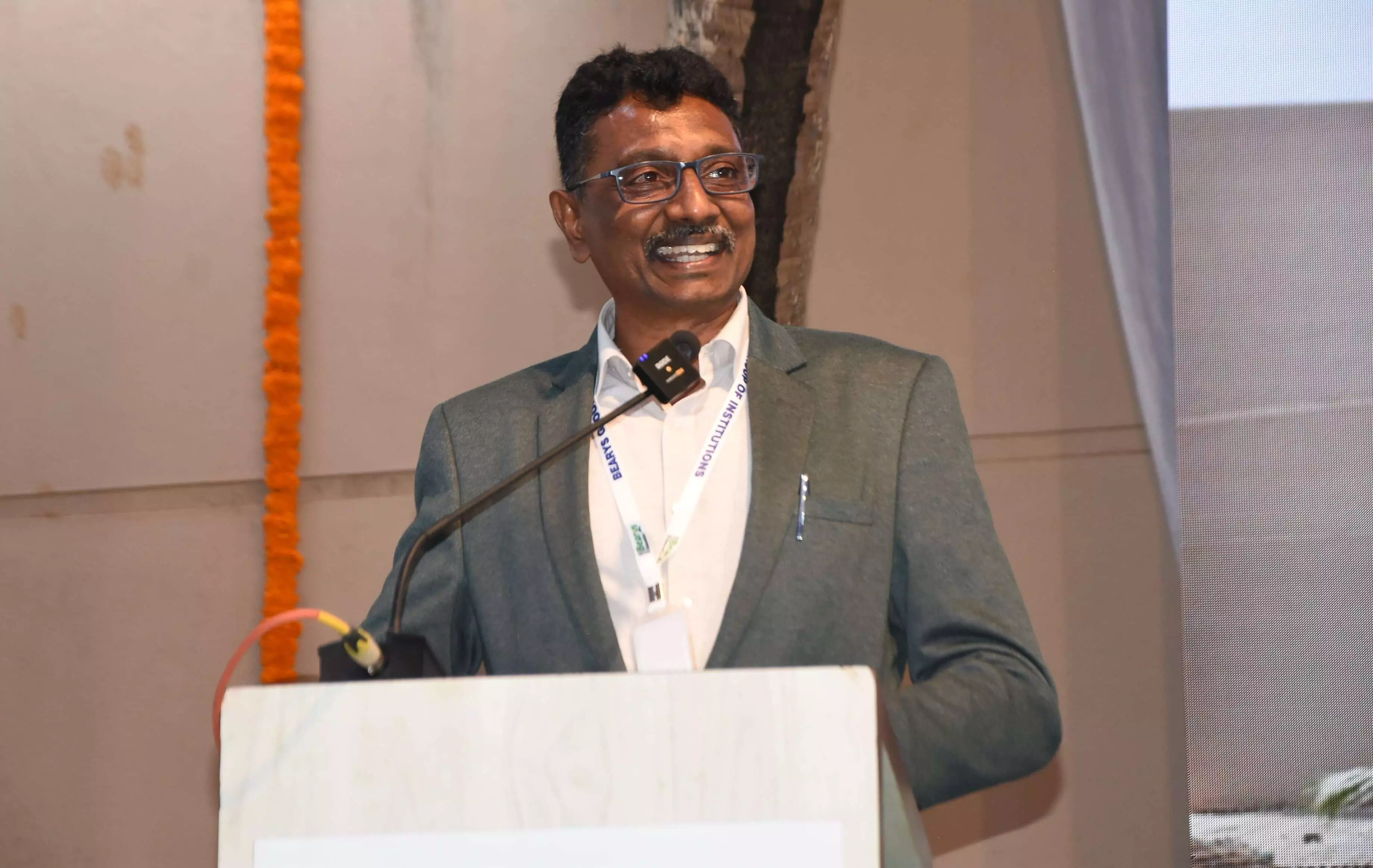
Professor Dr. P. L. Dharma: A Journey of Hard Times; and the Wisdom, and Inspiration Inherited throughout
NV Paulose, Chairman, Global TV +91 98441 82044

Prof. Dr. P. L. Dharma is renowned for his humility, approachability, and passion for education. He has dedicated his life to empowering students and transforming the lives of the less privileged. His journey from a humble background to his current position as the Vice Chancellor of Mangalore University is a nothing short of a film story. It is the power of passion, determination, and compassion.
A Humble Beginning
Born into a working-class family in a remote village, Professor Dharma’s early years were marked by financial struggles. His parents, estate labourers in a coffee plantation, worked tirelessly to make ends meet. When he completed his SSLC, further education seemed like an unattainable dream due to a lack of resources. Forced to leave his studies, young Dharma took up work at a local tailoring shop, earning a modest income to support his family.
It was during this time that an interventional moment changed the course of his life. His maternal uncle, an air force officer, intervened, insisting that Dharma return to his studies. This encouragement led him to Madikeri, where he stayed in a hostel and excelled academically, becoming a topper in his college. His journey continued in Mangalore, where he pursued a Master’s degree in Political Science, securing the first rank.
Empowering Others through Education
Professor Dharma’s personal struggles inspired him to uplift others. Recognizing the transformative power of education, he began advocating for the children of estate labourers in his community. With limited resources but an abundance of determination, he ensured that these children had access to school uniforms, slates, and other essentials.
Over the years, his efforts have resulted in the education of over 200 children from diverse backgrounds. Many of these students have gone on to secure stable jobs and build successful lives, breaking the cycle of poverty. Prof. Dharma attributes this achievement to divine blessings and the collective effort of like-minded individuals, including his sister, who helped place several young people in jobs.
A Visionary Leader at Mangalore University

As the Vice Chancellor of Mangalore University, Prof. Dharma’s leadership continues to reflect his unwavering commitment to education and societal progress. Under his stewardship, the university has seen initiatives aimed at fostering inclusive education and research excellence. His ability to connect with students and faculty alike has cultivated a collaborative and inspiring environment, further solidifying the university’s reputation as a hub of academic excellence.
Prof. Dharma’s emphasis on integration of traditional wisdom with contemporary advancements has redefined educational priorities, enabling the university to address the evolving needs of society. His vision extends beyond academic achievement, emphasizing the development of socially responsible citizens.
A Champion of Appreciative Inquiry
Prof. Dharma’s philosophy aligns closely with the principles of Appreciative Inquiry (AI), a behavioural science that emphasizes building on strengths rather than merely resolving problems. He believes that life is shaped by stories of transformation. For him, reflecting on the past is not about dwelling on hardships but cherishing the experiences that shape character and drive personal growth.
Prof. Dharma shares an emotional insight: “Our past is our treasure. It’s what makes us who we are today. By connecting with our experiences, whether bitter or sweet, we learn valuable lessons and develop a sense of responsibility towards others.”
The Balance between Inner and Outer Happiness
One of Prof. Dharma’s profound teachings is the distinction between outer and inner happiness. Outer happiness, he explains, is often shaped by societal expectations and material possessions, while inner happiness stems from alignment with one’s values and a sense of purpose.
“Outer happiness is a construction,” he says. “It’s influenced by how we adapt to social situations and meet external expectations. But inner happiness is cultivated. It is all about finding contentment within and living a life true to your values.”
This philosophy underscores his approach to life: a balance between adapting to external realities and nurturing an authentic, value-driven inner self.
A Message for the Younger Generation

Prof. Dharma is deeply concerned about the well-being of today’s youth. While acknowledging the improved standard of living, he urges young people not to take life for granted. “Life is full of struggles,” he says. “The comforts we enjoy today are the result of sacrifices made by those before us. It’s essential to value hard work, connect with your past, and appreciate the efforts of your elders.”
He encourages young people to embrace challenges as opportunities for growth and to pursue happiness that transcends material wealth. For him, true success lies in contributing to the well-being of others and living a life of purpose.
A Legacy of Compassion and Leadership
Prof. P. L. Dharma’s life is a shining example of how personal struggles can fuel a commitment to social transformation. His work in education, his openness, and his unwavering dedication to humanity have made him an inspiration to many.
In his own words, “Whatever God has given me, I have shared with my fellow people.” He is generous and service defines his personality. He leads Mangalore University into a great future connecting with its glorious past and striving for a renewed and revamped status where everyone has the opportunity to thrive.
Previous Episode
Professor Dr. PL Darma is joining us today on screen for today’s Appreciative Inquiry series. The series of Appreciative Inquiry is based on the behavioral science of Appreciative Inquiry, originating at the National Training Laboratory (NTL) in America. It says: When you keep on identifying mistakes and resolving problems, you can only maintain the status quo. When you want to achieve something, you should do something else, and that is based on your inner strength. Whether you are an individual, a society, a family, a city, or a nation, you have to look upon your own strength. For the city, it is the strength of the people of the city, the human capital.






good